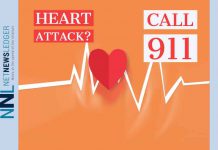
February is Heart Month – a good time for people to reflect on their lives and become more aware of what may affect their hardest working muscle. It is common knowledge that physical activity is good for you, but how much is really needed? What factors can increase your risk of heart disease? What is heart disease? Dr. Mark Henderson, Executive Vice President Patient Services & Regional Vice President Cancer Care Ontario, has over 30 years experience in angioplasty and interventional cardiology and weighs in on some of the best practices to reduce risks of heart disease.
To begin, heart disease is an umbrella term that refers to many heart conditions. These can include arrhythmias, angina, atherosclerosis, heart attack and many more.

Knowing that these are the risk factors for heart disease, it is very important to manage the ones you can control—your modifiable risk factors. A healthy diet is one of the most important aspects of a healthy lifestyle because it leads to many different health benefits. A healthy diet contributes to lower levels of cholesterol, which is highly associated with heart disease. Cholesterol, specifically LDL or low-density lipoprotein, is one of the fats in your blood and is responsible for the plaque buildup in artery walls. Plaque causes the arteries to narrow, a condition called atherosclerosis, which makes it more difficult for the heart to pump blood through the vessel. This can lead to heart disease, stroke and other circulatory issues.
A heart healthy diet:
- limit saturated fat (found in red meat and some dairy products) to less than 7% of daily calories
- avoid trans fats (found in shortening, fast foods and many pre-made foods)
- follow Canada’s Food Guide
- use healthier cooking methods such as baking, steaming or broiling instead of frying
Not all cholesterol is bad however, HDL or high-density lipoprotein, helps to remove the bad cholesterol within the arteries and can be increased by eating healthy fats (unsaturated fats) such as vegetable oils, nuts and fish.
As with a healthy diet, being physically active will help to maintain a healthy weight and provide other health benefits such as lowering blood pressure and reducing blood cholesterol levels. High blood pressure causes the heart to pump harder to send blood throughout the body and leads to potential health issues, especially when combined with high cholesterol. According to the Canadian Physical Activity Guidelines, adults aged 18-64 years should be moderately or vigorously active for a total of 150 minutes every week.
Diabetes increases the risk for a number of health issues, including heart disease. This is particularly true when blood sugar levels are poorly managed. Diabetes can be controlled primarily through a healthy diet, exercise and weight loss, so asking your doctor for a referral to a registered dietician is a great way to learn about healthy eating.
Dr. Henderson also suggests that “following your medication religiously is a very important aspect of living with diabetes”. Knowing how to test your own blood sugar levels is another important part of managing diabetes because you will be able to adjust your lifestyle accordingly. If you cannot keep it under control, always consult your doctor to design a plan that will work for you.
Dr. Henderson urges people to take control of their heart health and educate themselves about their own body. “I recommend that you do not smoke or stop smoking immediately, check for hypertension, check your cholesterol levels, eat well and be active. After all, the time to check yourself is now, not after your first heart attack.”
Warren Stevenson
To learn more about heart disease and what you can do to reduce your risk for it, visit the Heart and Stroke website at: www.heartandstroke.com.
Photo caption:
Dr. Mark Henderson, Executive Vice President Patient Services & Regional Vice President Cancer Care Ontario, advises that not smoking is the best thing that you can do for your heart health.

